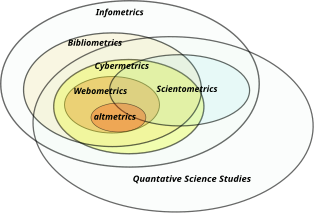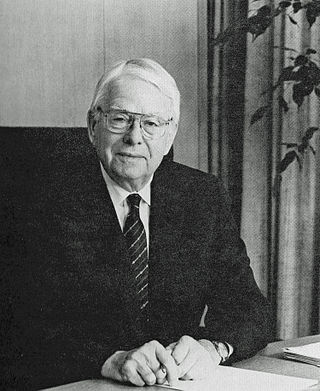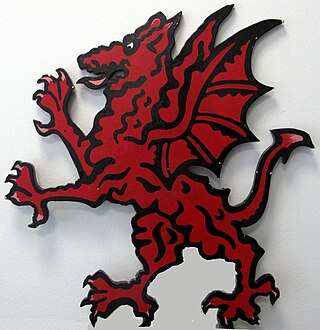Related Research Articles

"There's Plenty of Room at the Bottom: An Invitation to Enter a New Field of Physics" was a lecture given by physicist Richard Feynman at the annual American Physical Society meeting at Caltech on December 29, 1959. Feynman considered the possibility of direct manipulation of individual atoms as a more robust form of synthetic chemistry than those used at the time. Although versions of the talk were reprinted in a few popular magazines, it went largely unnoticed until the 1980s.

Information science is an academic field which is primarily concerned with analysis, collection, classification, manipulation, storage, retrieval, movement, dissemination, and protection of information. Practitioners within and outside the field study the application and the usage of knowledge in organizations in addition to the interaction between people, organizations, and any existing information systems with the aim of creating, replacing, improving, or understanding the information systems.
The Encyclopedia Galactica is the name of a number of fictional or hypothetical encyclopedias containing all the knowledge accumulated by a galaxy-spanning civilization.

A librarian is a person who works professionally in a library providing access to information, and sometimes social or technical programming, or instruction on information literacy to users.

A research library is a library that contains an in-depth collection of material on one or several subjects. A research library will generally include an in-depth selection of materials on a particular topic or set of topics and contain primary sources as well as secondary sources. Research libraries are established to meet research needs and, as such, are stocked with authentic materials with quality content. Research libraries are typically attached to academic or research institutions that specialize in that topic and serve members of that institution. Large university libraries are considered research libraries, and often contain many specialized branch research libraries. The libraries provide research materials for students and staff of these organizations to use and can also publish and carry literature produced by these institutions and make them available to others. Research libraries could also be accessible to members of the public who wish to gain in-depth knowledge on that particular topic.
The Master of Library and Information Science (MLIS), also referred to as the Master of Library and Information Studies, is the master's degree that is required for most professional librarian positions in the United States. The MLIS is a relatively recent degree; an older and still common degree designation for librarians to acquire is the Master of Library Science (MLS), or Master of Science in Library Science (MSLS) degree. According to the American Library Association (ALA), "The master’s degree in library and information studies is frequently referred to as the MLS; however, ALA-accredited degrees have various names such as Master of Information Studies, Master of Arts, Master of Librarianship, Master of Library and Information Studies, or Master of Science. The degree name is determined by the program. The [ALA] Committee for Accreditation evaluates programs based on their adherence to the Standards for Accreditation of Master's Programs in Library and Information Studies, not based on the name of the degree."

The following outline is provided as an overview of and topical guide to library and information science:

Verner Warren Clapp was a librarian, writer, and polymath.

Frederick Gridley Kilgour was an American librarian and educator known as the founding director of OCLC, an international computer library network and database. He was its president and executive director from 1967 to 1980.
Education for librarianship, including for paraprofessional library workers, varies around the world, and has changed over time. In recent decades, many institutions offering librarianship education have changed their names to reflect the shift from print media to electronic media, and to information contained outside of traditional libraries. Some call themselves schools of library and information science, or have dropped the word "library" altogether.

The Information School at the University of Washington is an undergraduate and graduate school that offers a BS in Informatics, a Master of Library Science MLIS degree, a Master of Science in Information Management MS, a Museology MA, and a PhD in Information Science.
Music librarianship is the area of librarianship that pertains to music collections and their development, cataloging, preservation and maintenance, as well as reference issues connected with musical works and music literature. Music librarians often have degrees in both music and librarianship. Music librarians deal with standard librarianship duties such as cataloging and reference, which become more complicated when music scores and recordings are involved. Therefore, music librarians generally read music and have at least a basic understanding of both music theory and music history to aid in their duties.
E-Science librarianship refers to a role for librarians in e-Science.

Mortimer Taube was an American librarian. He is on the list of the 100 most important leaders in American Library and Information Science of the 20th century. He was important to the Library Science field because he invented Coordinate Indexing, which uses "uniterms" in the context of cataloging. It is the forerunner to computer based searches. In the early 1950s he started his own company, Documentation, Inc. with Gerald J. Sophar. Previously he worked at such institutions as the Library of Congress, the Department of Defense, and the Atomic Energy Commission. American Libraries calls him "an innovator and inventor, as well as scholar and savvy businessman." Current Biography called him the "Dewey of mid-twentieth Librarianship." Mortimer Taube was a very active man with varying interests such as tennis, philosophy, sailing, music, and collecting paintings.

Ralph Robert Shaw was a librarian, a publisher, and an innovator in library science. In 1999, American Libraries named him one of the "100 Most Important Leaders We Had in the 20th Century". He was awarded American Library Association Honorary Membership in 1971.

The UNC School of Information and Library Science(SILS) is a professional school at the University of North Carolina at Chapel Hill offering a bachelor's degree in information science, master's degrees in library science and information science, a professional science master's degree in digital curation, and a doctoral degree in information and library science as well as an undergraduate minor, graduate certificate programs, and a post-masters certificate.
Ensemble librarianship is an area of music librarianship which specializes in serving the needs of musical ensembles, including symphony and chamber orchestras, opera houses, ballet companies, wind ensembles and educational institutions. Ensemble librarians acquire printed music and prepare it for performance.
Hal Draper was an American socialist activist and author who played a significant role in the Berkeley, California, Free Speech Movement. He is known for his extensive scholarship on the history and meaning of the thought of Karl Marx.

Pratt Institute School of Information, previously School of Information and Library Science (SILS), administers the oldest Library and Information Science program in North America. It was created in Brooklyn, New York City, in 1890 shortly after Melvil Dewey created such a program at Columbia University in 1887. Pratt School of Information is one of the six schools of Pratt Institute. Based in Manhattan, the school administers a master of information and library science degree program that has been accredited by the American Library Association since the 1924/1925 academic year.

The College of Librarianship Wales was a monotechnic college specializing in library and information science in Aberystwyth, Wales, between its foundation in 1964 and August 1989, when it was merged with University College of Wales to become the Department of Information & Library Studies of that institution. During its twenty-five years of independent existence the college grew to be the largest library school in the UK and one of the largest in Europe. It also gained an international reputation for library education,
References
- ↑ Torres-Moreno, Juan-Manuel (2014). Automatic Text Summarization. John Wiley & Sons. p. xii. ISBN 978-1-119-04407-9.
- ↑ Chambers, John (June 2006). "MS Fnd in a Lbry". trillian.mit.edu. JC's Humor Collection.
In June 2006 I found a link to copy of this at http://home.comcast.net/~bcleere/texts/draper.html. This seems identical to the version that I collected years ago from a mailing list.
- ↑ Burns, Grant (1998). Librarians in Fiction: A Critical Bibliography. McFarland. p. 136. ISBN 978-0-7864-8316-7.
- ↑ Fry, Alderson (April 1963). "Technological Advances in Medical Librarianship: A Symposium; Planning the Medium-Size Library for the Computer". Bulletin of the Medical Library Association. 51 (2): 211–3. PMC 197972 . PMID 13959964.
And I think you had better put in a conduit on the outside of the building, leading to this room, because there is a high percentage chance that your console will tap external storage machines, maybe in Washington even.